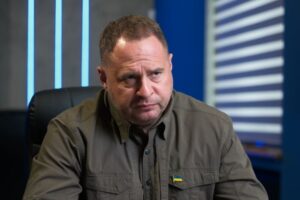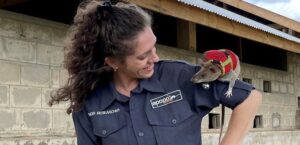
The National Anti-Corruption Bureau of Ukraine (NABU) and the Specialized Anti-Corruption Prosecutor’s Office (SAP) are conducting investigative actions (searches) at the office of the head of the Office of the President of Ukraine, Andriy Yermak. According to NABU’s Telegram channel, the investigative actions have been authorized and are being carried out as part of the investigation.
“Details to follow,” the message added.
Ukrainian MP Yaroslav Zheleznyak wrote on Telegram: “NABU has already confirmed to journalists that the searches are part of Operation Midas (popularly known as Mindichgate). Zheleznyak previously reported that in the context of the ”Mindich tapes“ on corruption in the energy sector, Yermak was mentioned under the pseudonym ”Ali Baba.”
According to the Anti-Corruption Center, details of the search at Yermak’s residence will be available “soon,” but at the same time, the ACC noted that NABU does not have the legal right to investigate the activities of the Ukrainian president. “NABU does not have the legal right to investigate the activities of the president. This restriction has been in place since its creation. Similarly, the FBI does not have the right to investigate the president of Ukraine due to diplomatic immunity. Therefore, Zelensky is not under any threat, and the commander-in-chief can and must continue to defend Ukraine from the occupiers,“ the Anti-Corruption Action Center said in a post on its Telegram channel.
During the discussion ”Mindychegate. Discussion with NABU, SAP, and veteran Kozyatinsky,“ a video of which was posted on the Ukrainian Truth YouTube channel, when asked whether Ali Baba continues to hold meetings and set tasks for the prosecution of NABU and SAP, SAP head Alexander Klimenko said, ”Yes.” NABU Director Semen Kryvonos responded to this question as follows: “I want to wake up in a country where law enforcement officials do not attend meetings with fairy-tale characters.”
As reported, on November 25, the secretary of the National Security and Defense Council (NSDC) of Ukraine, Rustem Umerov, was questioned by NABU as a witness in the case of businessman Timur Mindich’s back office.
On November 10, NABU and SAP announced a large-scale operation to expose corruption in the energy sector, which was named “Midas.” The activities of a high-level criminal organization have been documented, whose members have built a large-scale corruption scheme to influence strategic enterprises in the public sector, in particular JSC “NAEK ”Energoatom.” Energoatom confirmed that investigative actions were carried out at the company on November 10.
Among those identified by NABU as participants in the Midas scheme are Sergey Pushkar, a member of the National Energy Regulatory Commission (NKREKU), businessman Timur Mindich, former executive director for physical protection and security at Energoatom Dmitry Basov, and former advisor to the Minister of Energy and former deputy chairman of the State Property Fund Igor Mironyuk.
The main activity of the criminal organization was the systematic receipt of illegal benefits from Energoatom’s contractors in the amount of 10% to 15% of the contract value.
In particular, Energoatom’s contractors were forced to pay kickbacks to avoid having their payments for services rendered/products supplied blocked or losing their supplier status. Using their connections in the ministry and the state-owned company in particular, the former deputy chairman of the FGIU, who later became an advisor to the Minister of Energy, as well as a former law enforcement officer who held the position of executive director for physical protection and security at Energoatom, ensured control over personnel decisions, procurement processes, and the movement of financial flows.
Eight individuals, including former Deputy Prime Minister Oleksiy Chernyshov, have already been named as suspects.
Mindyich left Ukraine on November 10, a few hours before the searches. According to the State Border Service of Ukraine, he left on legal grounds.

A search of the office of investment company Concorde Capital without a warrant from an investigating judge on January 18 resulted in the seizure of employees’ personal phones and computers, as well as about a dozen folders of materials that do not relate to the time and territory of the criminal proceedings, the company’s press service said.
“So, the office itself is now paralyzed, and this entails inevitable losses and loss of clients. In addition, it is impossible to imagine the normal operation of an investment company without a head,” the head of the press service, Anna Dyakonova, told Interfax-Ukraine on Monday.
Earlier in the day, State Bureau of Investigation (SBI) Director Oleksiy Sukhachov said that the procedural actions of law enforcement officers in the case of Concorde Capital CEO and founder Igor Mazepa did not lead to blocking or limiting the business, and the company can fulfill its obligations in full.
“At the moment, there have been no actions that would block the business or limit the activities of the Concorde Capital investment fund, which allows it to continue to operate and fulfill its investment obligations in full,” said the SBI director at a briefing in Kyiv.
For her part, Dyakonova added that one of the clients has suspended a loan agreement for construction in the SHELEST project.
According to her, Mazepa also had a number of meetings scheduled in Davos to attract investment in Kryvyi Rih Cement, but now the implementation of the company’s expansion project is in question.
She also said that Mazepa’s lawyers have already appealed the court’s January 19 ruling to place him under arrest with an alternative bail of UAH 349 million, and confirmed that the head of Concorde Capital’s house in his small homeland in Chernihiv region burned down.
As reported, on January 18, SBI officers together with the National Police detained Mazepa on the Ukrainian-Polish border on charges of organizing a scheme to illegally seize 2.4 hectares, which allegedly contain hydraulic structures of critical infrastructure – Kyiv HPP, and currently house the premium cottage community Goodlife Park. It was noted that three more people, including Mazepa’s brother, were detained in different regions of Ukraine, and searches were conducted at the office of Concorde Capital and the offices of some of its employees.
According to the SBI, at the end of 2023, eight suspects were served with a similar case involving 7 hectares of land in the neighborhood and other people were arrested. According to the database of court decisions, these are land plots involved “in the process of implementing a construction project of elite housing – a premium club cottage town Riviera Village,” which was originally developed by the Dragon Ukrainian Properties and Development (DUPD).
The SBI indicated that the defendants face up to 12 years in prison with confiscation of property.

The Belgian NGO APOPO trains rats to search for people trapped under rubble, such as after earthquakes or hurricanes.
Previously, APOPO spent more than a decade at its base in Tanzania training dogs and Gambian hamster rats to search for mines and identify those infected with tuberculosis. The idea of rescue rats at APOPO had been nurtured for years, but the NGO lacked funding and a partner. The new project was launched in April 2021.
“Usually rats are quite curious, like to scout the area, and this is the most important thing for search and rescue operations,” said project leader scientist Donna Keane.
The rats are trained to search for survivors in an environment depicting a disaster area. Rodents are equipped with a high-tech “pack” that is attached to their body with a neoprene vest: after the rat finds the desired object in the room, it must pull the lever, giving a signal about the find, and then return to the base, where it will receive a reward for success.
Rat training is still at an early stage. APOPO, meanwhile, is working with the Technical University of Eindhoven in the Netherlands on a rat rescue pack: the prototype is a 3D-printed plastic container containing a live video camera, a bi-directional microphone, and a location-tagging transmitter. According to the developer of this equipment, Sander Verdizen, at first the rats did not understand what to do with it, but quickly adapted. “At the end of the day, they were just running around with a satchel, no problem,” he said.
However, the miniaturization of equipment, its adaptation to the conditions of the disaster zone turned out to be not an easy task. So, the GPS signal often does not pass through the ruins of destroyed buildings, but experts managed to get around this problem with the help of other trackers. Verdizen is also trying to make the “pack” more compact: although the current one weighs 140 g – twice as much as planned, its main problem is its size, with the current 10 cm in length. Later this year it is planned to introduce a modified version of the equipment.
Meanwhile, in Tanzania, Keane is making training more difficult for rats, preparing the animals for action in a real environment, accustoming them, for example, to the sounds of drilling equipment. So far, the results are encouraging: Keene says the rats are adapting well to increasingly challenging training environments. She recalled that from birth, rats have to survive in a variety of environments, including close to humans, which makes these mammals more stress-resistant in extreme situations.
However, APOPO does not forget to take care of future rescuers. They are not constantly trained – five days a week in sessions, fed with fresh fruits and vegetables, given time to relax in the playroom, although this pastime differs little from their training.
It takes at least 9-12 months to prepare a rat. In the meantime, Keane is planning the next stage of their training: teaching them how to operate in an environment that simulates a multistory collapsed building. Once the rats are comfortable with this, the plan is to move the project to Turkey, where APOPO’s partner, the volunteer rescue organization GEA, is based, and continue training the rats in an even more realistic environment. And only after that the rats can already be allowed to rescue work.
“Even if our rats can find one survivor in the ruins, I think we’ll be happy because we did a good deed,” said Keene.

Farvater Travel (Yuzhgorod) has launched the online package trip search and booking service, investing around $300,000 since the beginning of its creation, the co-founder of the company, Tetiana Pollak, told reporters during the presentation of the service in Kyiv. The service is based on the Online Travel Agency model and allows you to select the appropriate tour package from the list of parameters on the site among 29 million current offers of tour operators. “We the online service have not yet seen a payback. We need to grow another five times to become profit-making,” she said, adding that the company had already increased online sales five times in six months.
According to her, this year, with the help of this service, more than 1,000 tours with the cost from EUR 180 to EUR 4,100 (the average cost of one trip is EUR 1,170) were booked.
The company plans to increase the volume of the serviced part of the Ukrainian market of package tours from the current almost 1% to 7% in 2020.
The company sees the profit from the service according to the scheme, which is traditional for travel agencies – the fee from the price stated by the tour operator, Pollak said. “The company has been in the non-online market for a long time, it has a significant amount of sales, and because of this, we have the largest fee,” Farvater Travel CEO Andriy Shvets said. Travel Company Farvater has been operating since 2006. The first version of the online search site was launched in October 2017, and in December, the first customers appeared. The company is owned by Tetiana and Friedrich Pollak in equal shares. The charter capital Farvater Travel is UAH 20,000.
FARVATER TRAVEL, INVESTS, ONLINE, SEARCH, SERVICE, TRIP, YUZHGOROD